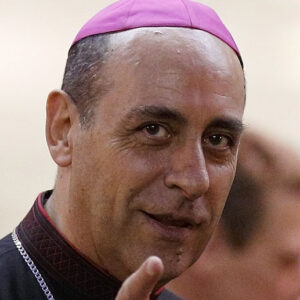“Heresies have been eradicated better and faster when there has been proper theological investigation, whereas, when we have been limited to condemnations, those errors have spread and become entrenched.”
So states Archbishop Victor Manuel Fernandez, recently appointed prefect of the Dicastery for the Doctrine of the Faith, in a recent interview published in La Civilta Cattolica and in the Jesuit journal ‘America‘.
The archbishop was responding to criticism of his appointment by conservative commentators who wonder if the Vatican will no longer be protecting the ‘deposit of faith’. Some critics have complained of Pope Francis’s public letter of appointment of the archbishop, which referred to ‘immoral methods’ used by the doctrinal watchdog body in the past, and instructed the new prefect to place his department at the service of evangelisation and the development of thought.
“If one reads the pope’s letter attentively,” replied Archbishop Fernandez, “it is clear that at no time does he say that the function of refuting errors should disappear. Clearly, if someone says that Jesus is not a real man or that all immigrants should be killed, decisive intervention will be necessary. But at the same time this will provide an opportunity to grow, to enrich our understanding. For example, in such cases the person in question will need to be accompanied to better explain the divinity of Jesus Christ, or conversations will need to be had about some flawed, incomplete or problematic migration laws.”
The archbishop also took the opportunity to tackle another grievance of Pope Francis’s high-level opponents, relating to the question of divorced and remarried Catholics and the Eucharist and the pope’s encyclical Amoris Laetitia. He did so by referring to a position taken by the bishops of the region of Buenos Aires:
“They speak of the possibility of divorcees living a new union in continence, but add that ‘in other more complex circumstances, and when it has not been possible to obtain a declaration of nullity, the option mentioned may in fact not be feasible. They then state that ‘nevertheless, a path of discernment is equally possible. If one comes to recognize that, in an actual case, there are limits that mitigate responsibility and culpability, especially when a person considers that he or she would fail by harming the children of the new union, Amoris Laetitia opens the possibility of accessing the sacraments of reconciliation and the Eucharist.’ Francis immediately sent them a formal letter, confirming that this is the meaning of Chapter Eight of Amoris Laetitia. He added, ‘There are no other interpretations.’ There is no need to expect different answers from the pope. Both the guidelines and the pontiff’s letter have been published in the Acta Apostolicae Sedis, along with a rescript declaring them part of the ‘authentic magisterium.’ Consequently, there are no longer any doubts, and it is clear that discernment, which takes into account conditioning or mitigating factors, can also have consequences in sacramental discipline.”
It remains to be seen if this will make any impression on figures such as Cardinal Raymond Burke, who has warned recently of the October 2023 ‘Synod on Synodality’ possibly leading to schism.
To read the full ‘America‘ interview with Archbishop Fernandez click here.


Is Tony Flannery going to be “accompanied”?
Or will the DDF ( ex CDF) thank him for helping to expose the immoral methods it has been using ?
http://www.tonyflannery.com/tg4-documentary-misneach-tony-flannery/